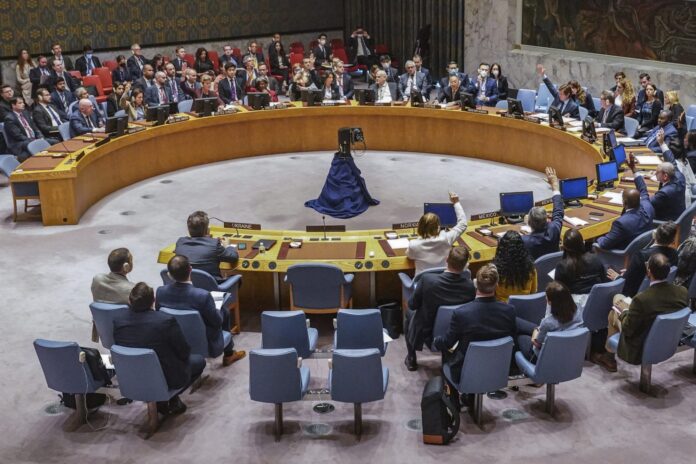Russia on Friday vetoed a UN Security Council resolution introduced by the United State and Albania condemning Moscow’s proclaimed annexation of parts of Ukraine, and China chose to abstain from the vote.
Earlier, Russian President Vladimir Putin proclaimed Russian rule over four regions that make up 15% of Ukraine’s territory – the biggest annexation in Europe since World War Two. The move has been firmly rejected by Western countries and even many of Russia’s close allies.
U.S. Ambassador to the U.N. Linda Thomas-Greenfield introduced the resolution that called on member states not to recognize any altered status of Ukraine and obliged Russia to withdraw its troops.
She argued in the council’s chamber that the attempted annexation of a sovereign nation’s territory went against the founding principles of the United Nations, and said Putin was celebrating “this clear violation of international law” with a concert held after he proclaimed the annexations on Friday.
“He threw a party on Red Square to pat himself on the back for these illegal referenda,” Thomas-Greenfield said.
Ten nations voted in favor, while China, Gabon, India and Brazil abstained.
Russian ambassador to the UN Vassily Nebenzia, who raised his hand to give the only vote against the resolution, argued the regions, where Moscow has seized territory by force and where fighting still rages, chose to be part of Russia. Kyiv and Western leaders denounced the referendums as a sham.
Trending Stories
Oakville teacher controversy: Ontario College of Teachers asked to review professional standards
Ukraine applying for NATO membership in wake of Russian annexation
“There will be no turning back as today’s draft resolution would try to impose,” Nebenzia said.
Canada introduces new sanctions on Russia over annexation of Ukraine regions
Following the vote, Ukrainian Ambassador Sergiy Kyslytsya said Russia had become a “tumour” within the Security Council that must be removed.
China, which has given Russia diplomatic cover since Moscow’s February invasion of Ukraine, abstained from the resolution, but raised concerns about “a prolonged and expanded crisis” in Ukraine.
China’s UN ambassador Zhang Jun argued that while “the sovereignty and territorial integrity of all countries should be safeguarded,” countries’ “legitimate security concerns” should also be taken seriously.
Secretary of State Antony Blinken said earlier on Friday that Washington would look to the U.N. General Assembly, the majority of which voted to condemn Russia’s Feb. 24 invasion of Ukraine, if the resolution failed.
“If Russia blocks the Security Council from carrying out its responsibilities, we’ll ask the U.N. General Assembly, where every country has a vote, to make clear that it’s unacceptable to redraw borders by force,” Blinken said.
Thomas-Greenfield reiterated the plan ahead of the vote, saying the General Assembly would “show that the world is still on the side of sovereignty and protecting territorial integrity.”
(Reporting by Simon Lewis and Timothy Gardner; Editing by Franklin Paul, Jonathan Oatis and David Gregorio)
—Additional files from Global News and the Associated Press
© 2022 Reuters



